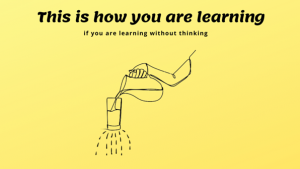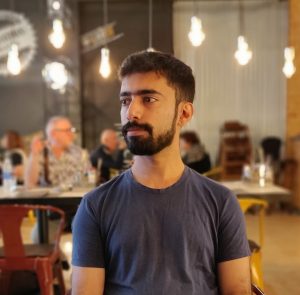Why Have We Forgotten Everything We Learnt In School?
In this article, the author argues that instead of monologues, teachers should focus on asking questions to students. This will force students to think, thus enabling life-long learning
Imagine pouring water into a glass. The only problem is that this glass has holes at the bottom. You keep pouring water into the glass and the water keeps leaking out.
This is exactly how we are taught at most of our schools. We are taught a topic, we remember and practice, score well in exams and then we forget everything. Every question asked to us in our exams can be answered easily by remembering the text in the chapter or by practicing every question in the book. If we are not made to think, then how will we learn?

What can teachers do to make water stay in the glass?
- Explain themselves many times
- Explain slowly
- Show a video or demonstrate an experiment
The answer is: None of the above. None of the above activities will help in ensuring children remember a concept for a long time. Then, what can teachers do?
Ask questions. Many questions from many angles. Test children many times. In fact, research says that the more you make children think, the more they remember for a long time.
Let me ask you another question: What do you remember about your school days? You might remember your friends and some of your teachers. You might remember the fun you had and, maybe, even the marks that you scored in your board exams. But, do you remember what you learnt in the topic of Respiration or Light?
No. Because we were never made to think about those concepts.
Students study about ‘sound’ but why are they never made to wonder – why can’t we see sound? Why does our own recorded voice seem so weird?
Students study about ‘light’ but why are they never made to wonder – how would world change if light did not travel in a straight line? Is black really a colour?
Dear Teachers! The next time you are tempted to repeat your explanation, ask yourself: what question can I ask my students? How can I make my students think and arrive at the answer on their own?
We understand that the school system has several limitations: limited time and resources to engage children, expectations of parents and the different kinds of students in each classroom.
But asking questions neither require too many resources nor too much of time. When you start asking more questions in your classroom, you will see your children becoming better thinkers with learning as an important by-product. It is a win-win situation for everyone.
So, the next time you are tempted to repeat your explanation, ask yourself: what question can I ask my students? How can I make my students think and arrive at the answer on their own?
When children think and arrive at the answer themselves, it ensures learning for a long time. As Socrates has said: ‘I cannot teach anyone anything. I can only make them think.’

This article is written by Aneesh Bangia, Co-founder, Open Door Education
Want to read more such though-provoking stories by our educationists? Click here
DISCLAIMER: Views expressed above are that of the author and do not reflect the views of the website. The Peeper Times does not assume any responsibility or liability for the same.
Do you feel strongly about something? Have a story to share? Write to us at info@thepeepertimes.com or connect with us on Facebook or Twitter




Comments are closed, but trackbacks and pingbacks are open.